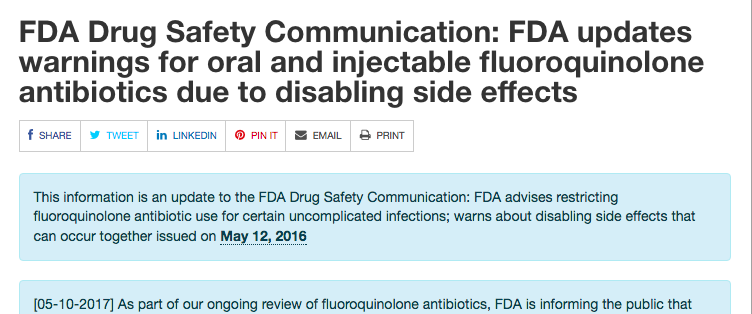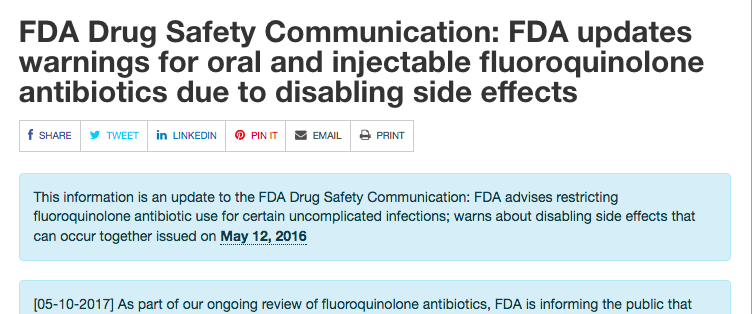In July, 2016, the FDA made significant changes to the warning labels for all fluoroquinolone antibiotics (Cipro/ciprofloxacin, Levaquin/levofloxacin, Avelox/moxifloxacin, Floxin/ofloxacin, Noroxin/norfloxacin, and Factive/gemifloxacin). These label changes include black-box warnings for fluoroquinolones that state:
WARNING: SERIOUS ADVERSE REACTIONS INCLUDING TENDINITIS, TENDON RUPTURE, PERIPHERAL NEUROPATHY, CENTRAL NERVOUS SYSTEM EFFECTS AND EXACERBATION OF MYASTHENIA GRAVIS
- Fluoroquinolones, including CIPRO®, have been associated with disabling and potentially irreversible serious adverse reactions that have occurred together including:
- Tendinitis and tendon rupture
- Peripheral neuropathy
- Central nervous system effects
- Discontinue CIPRO immediately and avoid the use of fluoroquinolones, including CIPRO, in patients who experience any of these serious adverse reactions. Fluoroquinolones, including CIPRO, may exacerbate muscle weakness in patients with myasthenia gravis. Avoid CIPRO in patients with known history of myasthenia gravis.
- Because fluoroquinolones, including CIPRO, have been associated with serious adverse reactions, reserve CIPRO for use in patients who have no alternative treatment options for the following indications:
- Acute exacerbation of chronic bronchitis
- Acute uncomplicated cystitis
- Acute sinusitis
You can view all of the updated fluoroquinolone labels HERE.
These updated black-box warning labels are HUGE steps in the right direction. The FDA is acknowledging, in a highlighted black-box section of the warning labels, that fluoroquinolone adverse-effects can be serious, irreversible, and disabling. They’re also acknowledging peripheral neuropathy and central nervous system effects, in addition to the adverse-effects on tendons, in the black-box warning. Additionally, the black-box warning states explicitly that fluoroquinolones should not be used for treatment of patients with chronic bronchitis, uncomplicated cystitis (I wish they would have said “urinary tract infections” instead of “cystitis” as they did in the hearings and preliminary documentation), and sinusitis, unless there are no alternative treatment options.
If this updated black-box warning had been in place when fluoroquinolones were first introduced to the market (in the 1980s and 1990s), many people would have been saved from being “floxed.” If these warnings had been in place when fluoroquinolones entered the market, or even when people started screaming about the significant damages and injuries caused by fluoroquinolones, perhaps more doctors would be aware of the dangers of these drugs, and they would be used more appropriately (only in life-or-death situations where there are no alternatives available). Currently, unfortunately, most people are not aware of the devastating effects of fluoroquinolones. Hopefully this updated black-box warning label will enlighten both patients and physicians about the serious and severe dangers of fluoroquinolones.
Prior to this update, the black-box warning for Cipro (and other fluoroquinolones) stated:
Fluoroquinolones, including CIPRO®, are associated with an increased risk of tendinitis and tendon rupture in all ages. This risk is further increased in older patients usually over 60 years of age, in patients taking corticosteroid drugs, and in patients with kidney, heart or lung transplants (see WARNINGS).
Fluoroquinolones, including CIPRO, may exacerbate muscle weakness in persons with myasthenia gravis. Avoid CIPRO in patients with known history of myasthenia gravis (see WARNINGS).
This 2008 black-box warning was hard fought for, as both Bayer and Ortho-McNeil-Janssen (a subsidiary of Johnson & Johnson) wanted to bury the risks of tendon ruptures in small-text embedded in the warning labels, rather than highlighting the increased risk in a black-box warning. It was only after Public Citizen sued the FDA that this black-box warning was added to fluoroquinolone warning labels.
Though the old black-box warning was a significant victory at the time, it left much to be desired. The statement that, “This risk is further increased in older patients usually over 60 years of age, in patients taking corticosteroid drugs, and in patients with kidney, heart or lung transplants,” suggests that those who are under 60 years of age, not taking corticosteroid drugs, and who have not had kidney, heart, or lung transplants, can safely take fluoroquinolones. Though it is also noted that the risk of tendon ruptures is increased for people of “all ages,” it is common to hear of people being told that they wouldn’t have problems with fluoroquinolones because only older people, or people with myasthenia gravis, are at risk for experiencing adverse-effects. This simply isn’t true, as there are thousands of people who have been hurt by fluoroquinolones who are under the age of 60, do not have myasthenia gravis, who are not on corticosteroid drugs, and who have not had an organ transplant.
The old black-box warning gave people (both patients and physicians alike) the impression that fluoroquinolones are only unsafe for certain, small sections of the population. The truth is, fluoroquinolones can cause devastating, severe, disabling adverse-reactions in people who are young and old, strong and weak, fit and out-of-shape, and, at this time, there is no way to determine who will have an adverse-reaction and who won’t. There are almost certainly factors that predispose some people toward having devastating adverse-reactions to fluoroquinolones while others seem to be able to take fluoroquinolones without problem, but we don’t know what those predispositions are. No one knows if people who have latent autoimmune or endocrine system disorders, or who have MTHFR genetic mutations, or who are G6PD deficient, or who have leaky gut, or who have been exposed to heavy metals, or any other potential risk factor, are more succeptible to fluoroquinolone adverse-reactions than anyone else. There is a dice-roll, a pull of the Russian roulette trigger, every time ANYONE takes a fluoroquinolone because NO ONE knows what the real risk factors are, or even how frequent/rare adverse-reactions are. I wish that it was explicitly said on the fluoroquinolone warning labels, preferably in the black-box warning, that risk-factors are currently unknown and that everyone who takes fluoroquinolones is potentially at risk for experiencing disabling adverse-effects.
I also wish that it was noted in the black-box warning that adverse reactions to fluoroquinolones can be delayed for weeks, months, or even years after administration of the drugs has ceased. And I wish that people were warned that ceasing administration of the drug may not stop the adverse-reaction, and that the symptoms of fluoroquinolone toxicity can continue long after the drug “should” be out of one’s system.
I also wish that the danger of co-administering fluoroquinolones and corticosteroid drugs had stayed in the black-box warning, and I wish that the contraindication of NSAIDs and fluoroquinolones was noted in the black-box warning.
I wish that “cystitis” was changed to “urinary tract infection,” or that they were both mentioned as ailments for which the use of fluoroquinolones is not appropriate unless there is no alternative. I also wish that prostatitis and travelers’ diarrhea were added to the list of ailments for which fluoroquinolones should not be used unless there is no alternative.
Perhaps the next iteration of the black-box warning on fluoroquinolones will note those things. I wish I, and my doctor, had been warned more thoroughly about the dangers of fluoroquinolones before she prescribed them to me, and before I took them. Hopefully the updated black-box warning label will help physicians and patients to realize how dangerous fluoroquinolones are, and will keep many people from getting “floxed.”
Though the updated black-box warnings still leave a bit to be desired, they are a HUGE step in the right direction. Acknowledgement from the FDA that fluoroquinolone adverse-effects can be irreversible and disabling, and that they should not be used to treat many common conditions unless there are no other treatment options available, is very big news, and it should be celebrated. We are making progress, and hopefully fewer people will be hurt by fluoroquinolones because of these black-box warning updates.












… [Trackback]
[…] Read More on that Topic: floxiehope.com/updated-black-box-warnings-for-fluoroquinolones/ […]
… [Trackback]
[…] Find More Information here on that Topic: floxiehope.com/updated-black-box-warnings-for-fluoroquinolones/ […]
… [Trackback]
[…] Read More on to that Topic: floxiehope.com/updated-black-box-warnings-for-fluoroquinolones/ […]
… [Trackback]
[…] Information on that Topic: floxiehope.com/updated-black-box-warnings-for-fluoroquinolones/ […]
… [Trackback]
[…] There you will find 40176 additional Information on that Topic: floxiehope.com/updated-black-box-warnings-for-fluoroquinolones/ […]
… [Trackback]
[…] Read More on to that Topic: floxiehope.com/updated-black-box-warnings-for-fluoroquinolones/ […]
… [Trackback]
[…] Find More to that Topic: floxiehope.com/updated-black-box-warnings-for-fluoroquinolones/ […]
… [Trackback]
[…] Find More on that Topic: floxiehope.com/updated-black-box-warnings-for-fluoroquinolones/ […]
… [Trackback]
[…] Find More Info here to that Topic: floxiehope.com/updated-black-box-warnings-for-fluoroquinolones/ […]